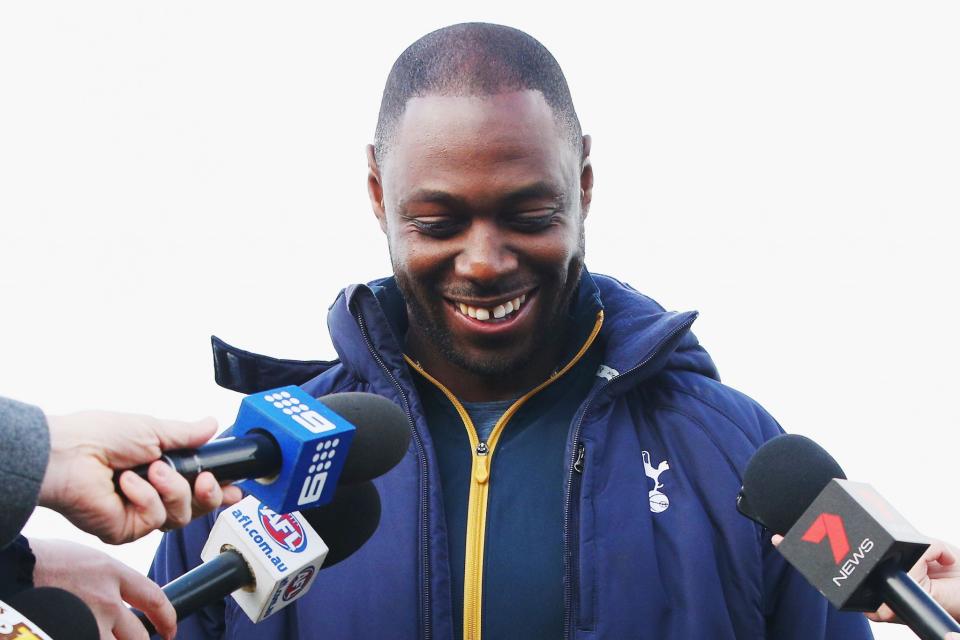Scott Parker is a valuable recruit for Tottenham's academy, says Ledley King

Tottenham may still be the only Premier League side yet to sign a player, but they secured one notable recruit for their academy earlier in the summer.
Scott Parker, who represented the Lilywhites between 2011 and 2013, hung up his boots at the end of June and promptly joined Spurs’ youth development programme, becoming the new Under-18 coach while also taking up an ambassadorial role.
It looks a smart move from Tottenham, who have been developing a conveyor belt of their own homegrown talent – Harry Kane, Ryan Mason, Andros Townsend and Harry Winks have all become first-team regulars in recent years, and Josh Onomah, Kyle Walker-Peters and Cameron Carter-Vickers have started two of Spurs’ three pre-season matches this year.
READ MORE: Tottenham guide to the 2017-18 Premier League season
READ MORE: Gossip – Inter ‘to raid Liverpool for Mane,’ Liverpool to ‘go for Lemar’, Chelsea ‘want Drinkwater’
Parker, 36, is synonymous with professionalism and boasts a wealth of experience after playing for five London clubs, plus Newcastle, while being a key man for England at Euro 2012.
Tottenham’s legendary ex-captain Ledley King, who played alongside Parker at White Hart Lane, is sure his former team-mate will now be an asset when it comes to moulding the next group of Spurs hopefuls.

“Scott’s been preparing for his retirement by doing his badges and he’s worked with a lot of the young players at Tottenham, where he was doing his badges [when he played here],” said King.
“He’s a great guy to have at the club, a great guy for the young kids to learn from. He’s got a real work ethic. He’s the kind of character we want, and I’ve got no doubt he’ll be a big success.
“He’s been a young player who has dealt with a lot of attention and come through a youth system to go on and represent his country, playing for some big teams in the Premier League.
“Sometimes it’s not the ones you think that go into coaching, but Scott has always been a great character, a great team member. I always knew he would have the potential, it was just up to him which path he wanted to go down.
“The club will identify the kind of characters it wants to have around the place. John [McDermott, the academy manager] is brilliant. He has a great eye for talent – not just players but coaches as well.
“He’s seen a lot of coaches, he’ll know who he thinks can be a success at the club and he’ll bring in the right people. Scotty is that kind of guy.
“Someone like Michael Dawson is another – he was doing his badges at the club before he left. You want to surround the club with as many of the right characters as possible to help the young players.”
King – speaking during Tottenham’s tour of the USA, where he held Q&As with various supporters’ groups – has some insight into what it is like to make the transition from playing to coaching, and some of the challenges that are involved.
He was given a part-time role helping out with the Under-18s in the summer of 2014 but has since put that to one side, for now at least.
Asked what he found most difficult, King replied: “I think coming from the professional mentality where every point matters, every mistake is magnified, to then working with young kids where you have to allow them to make mistakes to develop themselves.
“As a defender, the last thing you want to do is make mistakes and cost goals. But at the same time you need to allow young players to try to do things to evolve their game. They will quickly learn when they can and can’t get away with things. You want players to have all the tools possible and you can’t restrict them.
“That was the switch of mentality needed. Scott’s been doing his badges for a while and I think he understands that more than I did. He’s further down the line with his badges and he’ll have no problem.
“The game has changed as well and that’s another adjustment. The way the game is played now is different to how I was coached, and how kids in my era were coached. But people who are doing their badges – people like Scott – will have learned these things along the way.
“Is there a chance I’ll go back into coaching? Yes, there is a chance. It’s difficult for me to keep talking and talking about it, but eventually I believe I’ll try it, because I still love the game and it intrigues me.
“I’ve got a lot to learn about that coaching side so it’s slow steps for me, but you have to enjoy it. If I do, then it’s something I believe I’ll do well – if I have that enjoyment, the way I did as a player.”
Coaching is key to Mauricio Pochettino’s philosophy at first-team level too, and King has been impressed with the development of Eric Dier.
The 23-year-old arrived as a centre-back in 2014 but is now at least as comfortable in the centre of the pitch. Indeed, he is now England’s first-choice holding midfielder and has been courted by Manchester United this summer – although that unwelcome pursuit appears to be over now Jose Mourinho has signed Nemanja Matic from Chelsea for £40million instead.
Again, King is familiar with the adjustments Dier has had to make – a fine centre-back, he also had outings in midfield and played in that position for his country at Euro 2004.
“I remember watching Eric in pre-season in Denver [two years ago], and he impressed me straight away,” said King. “At that time I didn’t know he could step into midfield and perform that well.
“I quickly saw he was capable of that, and he went on to have a great season in midfield. I’m not sure what position he would say he wants to play in, but equally he does both positions as well.
“It can be difficult but it’s the sign of a good player, that they can play in multiple positions. When you’re competing in a tough team that’s full of top players, you’re usually happy to be on the pitch and to have a starting position – and if he feels as comfortable at the back as he does in midfield, it may be no problem to him.
“I found midfield a lot harder than I did playing at the back. I was used to having the game in front of me, seeing everything in front of me. But when you’re playing in the middle, people are coming from all different angles.
“The hardest thing I found was receiving the ball from your back players, when you’ve got your back to the opposition, and the awareness around that. But I was never really coached to play in that position. It was just an adjustment.
“Now I think the way football is played, everyone’s a lot more comfortable receiving the ball anywhere on the pitch. People rotate a lot more now and that’s one of the things that surprised me about how easy it was for Eric.
“With the ball at his feet he looks very comfortable and very cultured in possession. He doesn’t give the ball away at all but also he’s not just playing sideways and backwards, he’s turning on the ball under pressure and playing forward balls, and he’s been brilliant.”
Dier’s versatility has given Spurs great tactical flexibility too, allowing them to switch seamlessly from a 4-2-3-1 to a 3-4-2-1 system and back again as he alters his role.
“That’s a great strength that this team has,” said King. “It’s able to play with three centre-halves or two, so you can change.
“You’ve seen the team change mid-game. You’ve seen Eric either step out or step back and make subtle adjustments. It’s a great strength for any team to have, without having to change your personnel. It makes it a lot easier.”
Follow me on Twitter @BenPearceSpurs and visit my Facebook page at www.facebook.com/BenPearceSpurs/

 Yahoo Sport
Yahoo Sport 






































